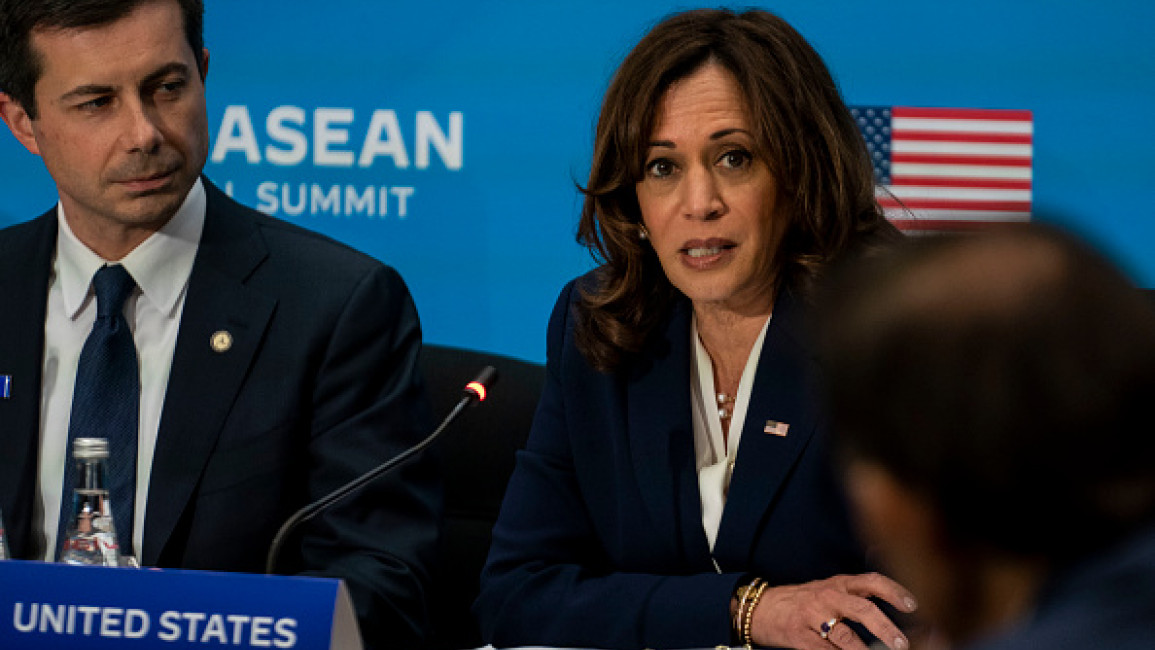Leading officials head to UAE to pay respects following president's death
A US delegation led by Vice President Kamala Harris flew to the UAE on Monday to pay respects to the country's late president and meet its new ruler.
The delegation will include Secretary of State Antony Blinken, Defense Secretary Lloyd Austin, CIA Director William Burns and climate envoy John Kerry among others. It marks the highest-level public visit to the oil-rich capital of Abu Dhabi by Biden administration officials.
The UAE named Abu Dhabi Crown Prince Sheikh Mohammed bin Zayed Al-Nahyan its new president following the death of his half-brother last Friday. Sheikh Mohammed has served as the country's de facto ruler and shaped the country's notorious foreign policy since Sheikh Khalifa bin Zayed Al-Nahyan suffered a stroke nearly a decade ago.
This coincided with a shocking crackdown on dissent in the country, jailing dozens of activists, as well as supporting anti-democratic forces in the region.
His rule - and MbZ's de-facto one - also coincided with the UAE's normalisation with Israel, despite huge backlash in the Arab world.
An array of presidents and prime ministers have descended on the desert sheikhdom over the weekend to honour the late Sheikh Khalifa, praise Sheikh Mohammed and solidify ties.
French President Emmanuel Macron and British Prime Minister Boris Johnson were the first European leaders to jet to the UAE capital.
Before heading to Abu Dhabi, Harris said she was traveling on behalf of President Joe Biden to offer condolences on the death of the long-ailing Sheikh Khalifa and to shore up Washington's relationship with the UAE.
"The United States takes quite seriously the strength of our relationship and partnership with the UAE," Harris told reporters. "We are going there then to express our condolences but also as an expression of our commitment to the strength of that relationship".
Blinken was first to touch down in Abu Dhabi before talks with his Emirati counterpart. Officials were vague about the agenda, but it was widely expected they would address the UAE's long-simmering frustrations about American security protection in the region as well as tensions that have emerged between the countries over Russia's war on Ukraine.
The UAE, along with Saudi Arabia, has faced intense American pressure to shun Russia and pump more oil to improve stability in energy markets as Europe tries to wean itself off Russian crude.
But the UAE is a key Russian trading partner and member of the so-called OPEC Plus agreement, of which Russia is an important member. Emiratis have rebuffed American demands- resistance rooted in an apparent feeling that despite its continued military presence across the Arabian Peninsula, America is no longer such a reliable partner.
Washington has also been angered by China's growing presence in the UAE and to a certain degree, its interference in Middle East states. The UAE has been one of the main Arab backers for normalisation with the brutal Assad regime in Syria.
After taking office, Biden lifted a terrorist designation on Yemen's Iran-backed Houthi rebels that have fired missiles and drones at the UAE and Saudi Arabia, and is trying to revive Tehran's tattered nuclear deal with world powers- an accord that Gulf Arab states fear could embolden Iran and its proxies.
America's abrupt and chaotic withdrawal from Afghanistan last summer and its long-term foreign policy goal of pivoting away from the Middle East and toward China has added to Gulf Arab concerns. Meanwhile, the Biden administration has suspended the sale of F-35 fighter jets to the UAE agreed by former President Donald Trump.
Trump had scrapped Iran's nuclear deal and heavily courted Emirati and Saudi officials.
Earlier this spring, Yousef Al-Otaiba, the UAE's ambassador to the US, described the allies as going through a "stress test".


![Minnesota Tim Walz is working to court Muslim voters. [Getty]](/sites/default/files/styles/image_684x385/public/2169747529.jpeg?h=a5f2f23a&itok=b63Wif2V)




![An Israeli air strike on Jabalia killed teenage journalist Hassan Hamad [Screengrab/X]](/sites/default/files/styles/image_330x185/public/2024-10/hassan%20hamad1.jpg?h=c12e0b96&itok=Rd_dyCVp)

![Israeli strikes on Beirut [Getty]](/sites/default/files/styles/image_330x185/public/2176155077.jpeg?h=a5f2f23a&itok=Xq7ypWgM)